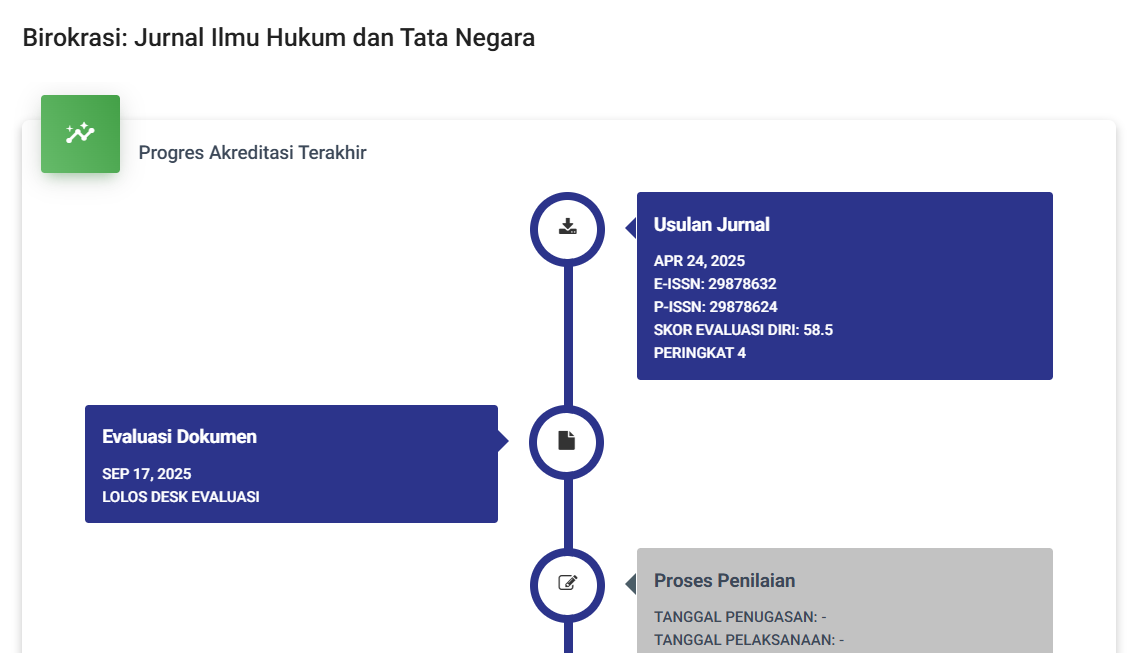Strategi Perencanaan Investasi Pariwisata di DPMPTSP Kota Prabumulih
DOI:
https://doi.org/10.55606/birokrasi.v2i4.1517Keywords:
Formulation, Tourism Investment, DPMPTSP, Tourism Investment PlanningAbstract
Riko Prayudi. This study aims to analyze the DPMPTSP Strategy Formulation in Planning Tourism Investments in Prabumulih City. The study used qualitative methods with data collection, namely observation, interviews and documentation. The results show that from the aspect of vision and mission, it can be guaranteed that the Office of Investment and One Stop Integrated Services (DPMPTSP) of Prabumulih city has tried to realize the vision that has been set by carrying out several missions that have been determined. Identification of External Opportunities and Threats of an Organization From the Aspects of Identification and External Threats An organization can open that there are still many opportunities for Prabumulih City to develop but also many future threats if the Prabumulih City DPMPTSP does not improve and does not adapt to the times. From the aspect of Awareness of the Strengths of Internal Strengths and Weaknesses, it can be said that there is tourism potential and hotels that can support investment into Prabumulih city, while the weakness is in the minimal natural tourism potential and the problem of weak human resources. From the aspect of Long-Term Determination that the long-term goal of what DPMPTSP wants to achieve in planning tourism investment in Prabumulih City is to make Prabumulih city a developed city and then increase the economic growth of the Prabumulih City community. From the aspect of Searching for Alternative Strategies, it can be said that the strategic plan has been implemented properly through the vision, mission and goals that have been set so that it is easier to realize what is the hope of making Prabumih City Prima.
References
Abbas, Syahrizal. (2009). Manajemen Perguruan Tinggi. Jakarta: Kencana Prenada Media Goup.
Arikunto, Suharsimi. 2006. Prosedur Penelitian, Suatu Pendekatan Praktek. Jakarta: Rineka Cipta.
Bungin, Burhan. 2013. Metodologi Penelitian Sosial: Format-format Kuantitatif dan Kualitatif. Surabaya: Airlangga University Press.
Daradjat, Zakiah. 2012. Ilmu Pendidikan Islam. Jakarta: Bumi Aksara.
Daulay, Haidar Putra. 2012. Pendidikan Islam Dalam Mencerdaskan Bangsa. Jakarta: Rineka Cipta.
Hakim, Lukman dan Armia, Chairuman. 2009. Reformasi Manajemen Pendidikan Tinggi. Jakarta: Media Ekonomi Publishing.
Lexy J Moleong, 2007 . Metode Pendidikan Kualitatif. Bandung: PT. Remaja Rosda Karya
Miles, Matthew dan Huberman, A. Michael. 1992. Analisis Data Kualitatif: Buku Sumber Tantang Metode-Metode Baru. Jakarta:UI Press.
Mulyana, Dedy. 2011. Metodologi Penelitian Kualitatif: Paradigma Baru Ilmu Komunikasi dan Ilmu Sosial lainnya, Bandung: Remaja Rosydakarya.
Mulyasana, Dedi. 2012. Pendidikan Bermutu dan Berdaya Saing. Bandung: Remaja Rosdakarya.
Putra Daulay, Haidar. 2012. Pendidikan Islam Dalam Mencerdaskan Bangsa, Jakarta: Rineka Cipta.
Rusmaini. 2011. Ilmu Pendidikan. Palembang: Grafika Telindo Press.
Sallis, Edward. 2012. Total Quality Management in Education: Manajemen Mutu Pendidikan, Jogjakarta: Ircisod.
Sekolah Tinggi Ilmu Tarbiyah Al Qur’an Al Ittifaqiah (STITQI). 2016. Profil Sekolah Tinggi Ilmu Tarbiyah Al Qur’an Al Ittifaqiah. Ogan Ilir: Tinggi Ilmu Tarbiyah Al Qur’an Al Ittifaqiah.
Sugiyono. 2012. Memahami Penelitian Kualitatif. Bandung: Alfabeta.








